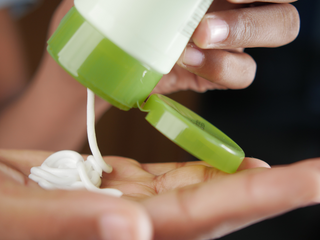If your skin turns red, itchy, or breaks out after washing your face—you might already know you have sensitive skin. But did you know your face wash could be silently making things worse?
Most people assume their face wash is helping. After all, it foams, smells nice, and leaves your skin feeling squeaky clean. But for sensitive skin types, that squeaky-clean feeling often means stripped, inflamed, and over-cleansed.
Let’s uncover what your skin truly needs and which cleanser is best when your barrier feels under attack.
What Does a Skin Cleanser Actually Do?
First, let’s break down the basics of skin cleanser meaning. A cleanser’s job is to remove dirt, oil, sweat, makeup, and pollution from your face—without disrupting your skin’s natural barrier.
Most face washes are made of four parts:
-
Water: Usually the main base.
-
Surfactants: Cleansing agents that trap oil and grime.
-
Preservatives: Prevent microbial growth in water-based formulas.
-
Add-ons: Foaming agents, fragrance, color, or active ingredients.
Here’s the issue: most conventional face washes use harsh surfactants like SLS (Sodium Lauryl Sulfate) or SLES (Sodium Laureth Sulfate).
Why Surfactants Are Often the Problem
An extensive review by the Cosmetic Dermatology (2021) found that surfactants like SLS and SLES can disrupt the skin barrier and worsen conditions like eczema and rosacea.
Surfactants are what give your cleanser that satisfying lather. But that foam comes at a cost. They are like detergents. Great at removing oil and dirt, but they don’t differentiate between:
-
Pollution on your face
-
And your skin’s natural protective oils
Especially in sensitive skin, this results in:
-
Barrier damage
-
Increased redness
-
Microbiome disruption
-
Long-term inflammation
According to the EWG and COSMOS certifications:
-
SLS & SLES = Not suitable for sensitive skin
-
Cocamidopropyl Betaine = Moderately irritating
-
Glucosides, Glutamates, and Isethionates = Gentle, safer choices

Sensitive skin needs protection, not stripping — harsh cleansers weaken your barrier
Common Signs Your Face Wash Is Too Harsh
If you're experiencing any of these, your cleanser might be harming more than helping:
-
Tightness or stinging after cleansing
-
Redness, especially around the cheeks or chin
-
Burning sensation when applying skincare
-
Recurring breakouts or dry patches
For many, this daily damage adds up—eventually resulting in chronic inflammation or eczema-like flare-ups.
What Sensitive Skin Actually Needs
Instead of foam and fragrance, your skin needs:
-
Barrier support, not stripping
-
Microbiome protection, not disruption
-
Hydrating ingredients, not alcohols or drying agents
This is why the best facial cleanser for breakouts or redness is often non-foaming and oil-based.
Enter Oil-Based Cleansing: A Better Way to Clean
According to a PubMed 2004 study , mild oil-based cleansers can effectively dissolve dirt and sebum without disrupting the skin barrier—making them especially beneficial for sensitive or inflamed skin.
Cleansing oils work on a simple principle: oil dissolves oil. They lift makeup, sunscreen, and impurities without damaging your skin barrier.
In fact, the oil cleansing method has been used for centuries in Ayurveda, Japanese rituals, and Roman baths.
Benefits of Oil-Based Cleansers:
-
Gently dissolve excess sebum and grime
-
Hydrate while cleansing
-
Soothe irritated skin
-
Protect skin flora and lipid barrier

A gentle, barrier-supportive cica oil cleansing balm formulated for reactive and redness-prone skin.
Which Cleanser Is Best for Sensitive Skin?
If you're looking for a face wash good for sensitive skin, choose one that is:
-
Free from SLS, parabens, and synthetic fragrance
-
Made with cold-pressed plant oils
-
Low-foaming or non-foaming
-
Tested for barrier-friendly pH
A good example? Our CICA Repair Cleansing Balm— designed specifically for red, reactive skin. It cleanses while repairing and calming skin, using CICA and therapeutic-grade oils like sunflower, castor and grapeseed oils.
Facewash for Pigmentation: What to Choose
For those dealing with both sensitive skin and pigmentation, harsh brightening cleansers can backfire. Ingredients like AHAs or glycolic acid can inflame the skin.
Instead, opt for a gentle cleanser that includes anti-inflammatory and melanin-balancing oils like geranium and german chamomile. African Black Facewash includes both of these essential oils and more that gently support pigmentation repair and even skin tone.
These support even tone without triggering irritation.
How to Use a Cleanser (The Right Way)
Most people over-cleanse. Sensitive skin thrives on less, not more. Learn about how Overcleansing and Harsh Skincare can Damage Skin Barriers.
Here’s how to use a cleanser:
-
Evening: Use your cleanser oil based with gentle massage (30-60 seconds).
-
Morning: Just rinse with water, or use a damp soft cloth.
-
Pat dry, never rub.
-
Follow with barrier cream or calming oil.
Pro Tip: Skip physical exfoliants and foaming cleansers during flare-ups. Your skin needs healing, not friction.

Oil cleansers lift away dirt and makeup without disrupting the skin barrier.
Transitioning to a Gentle Cleanser
Switching from a foaming cleanser to an oil-based one?
Follow this detox guide:
-
Start with oil cleansing at night
-
Skip harsh actives like salicylic acid for 2–3 weeks
-
Apply a barrier-repair cream immediately after
-
Observe your skin’s response (less redness, fewer breakouts)
Give it 3–4 weeks. Most users notice a calmer, smoother complexion by week two.
Final Takeaway: Don’t Let Your Cleanser Work Against You
Your face wash should feel like a hug, not a scrub.
If you're battling daily irritation, it’s time to rethink what you're using to cleanse.
Switch to a gentle cleanser that supports your skin's healing instead of compromising it. Whether you’re dealing with pigmentation, breakouts, or just constant sensitivity, choosing the right cleanser makes all the difference. Your skin will thank you.
FAQs About Facewash for Sensitive Skin Type
-
Which face wash is good for sensitive skin and redness?
The best face wash for sensitive skin is one that’s free from SLS, parabens, and artificial fragrance. Look for a gentle cleanser like Oleum Cottage’s CICA Repair Cleansing Balm with barrier-supportive ingredients. -
How do I know if a face wash is irritating my skin?
If you experience tightness, stinging, or redness after washing, your cleanser may be too harsh. These are signs that the surfactants are disrupting your skin barrier. -
What is the meaning of skin cleanser and how is it different from face wash?
Skin cleanser is a broader term that includes oil-based, milk-based, and balm cleansers. A face wash typically contains surfactants and water, which may not suit reactive skin. -
Is oil cleansing better than foaming face wash for pigmentation?
Yes. Oil cleansing doesn’t strip the skin and can help reduce inflammation, which contributes to pigmentation. It also helps retain moisture and strengthen the skin barrier. -
How to use a cleanser that is an oil based balm for sensitive skin?
Take a pea sized amount of cleanser, massage gently into dry skin, and wipe off with a soft damp cloth. Follow with a barrier-repair product. Avoid scrubbing or hot water. -
Which cleanser is best for oily yet sensitive skin?
A cold-pressed oil cleanser with non-comedogenic oils like grapeseed is ideal. It balances sebum production without irritating the skin. -
Can a gentle cleanser help with breakouts?
Yes. The best facial cleanser for breakouts is one that calms inflammation, doesn’t strip the skin, and respects the skin’s microbiome. -
What’s the best facewash for pigmentation and redness?
Look for a face wash good for sensitive skin that also contains calming oils like french lavender, chamomile, or geranium— they target both redness and dark spots. -
Are surfactants always bad for sensitive skin?
Yes, most commercial surfactants like SLS are too harsh. Choose cleanser oil based or balm cleansers — they are safer and gentler. -
How long does it take to see results after switching to an oil cleanser?
Most people see a difference in 2–3 weeks — reduced redness, fewer flare-ups, and calmer skin after consistent use of a cleanser oil based and barrier-friendly routine.
Related Reading:
· What is your Skin Barrier, and how Overcleansing and Harsh Skincare can Damage it?
· Why ‘Gentle’ Skincare Still Triggers Flare-Ups in Sensitive Skin? Sensitive Skincare Tips
· 5 Home Remedies to Soothe Sensitive Skin
About the Authors
Vidhi Dave is a certified Aromatherapist with 11 years of experience specialising in the therapeutic use of essential oils and cold-pressed oils for chronic skin and scalp concerns like eczema, dermatitis, and psoriasis. As co-founder of Oleum Cottage, she leads one-on-one aromatherapy consultations, guiding customers on how plant oils can restore balance and resilience to sensitive skin. Known for her deep knowledge of oils and their emotional as well as physical benefits, Vidhi helps people reconnect with nature’s healing intelligence in their daily routines.
Kasturi Sen is a certified practitioner in Cosmetic Science and Formulation with over 10 years of experience in designing evidence-based, natural solutions for chronic skin conditions. As co-founder of Oleum Cottage, she focuses on research-driven product development rooted in dermatological science and modern studies on skin physiology. Kasturi is known for her calm, intuitive presence and her ability to bridge cosmetic science with plant-based formulations, offering personalised, science-backed skincare journeys that empower people to manage their skin confidently.
About the Authors
Vidhi Dave is a certified Aromatherapist with 11 years of experience specialising in the therapeutic use of essential oils and cold-pressed oils for chronic skin and scalp concerns like eczema, dermatitis, and psoriasis. As co-founder of Oleum Cottage, she leads one-on-one aromatherapy consultations, guiding customers on how plant oils can restore balance and resilience to sensitive skin. Known for her deep knowledge of oils and their emotional as well as physical benefits, Vidhi helps people reconnect with nature’s healing intelligence in their daily routines.
Kasturi Sen is a certified practitioner in Cosmetic Science and Formulation with over 10 years of experience in designing evidence-based, natural solutions for chronic skin conditions. As co-founder of Oleum Cottage, she focuses on research-driven product development rooted in dermatological science and modern studies on skin physiology. Kasturi is known for her calm, intuitive presence and her ability to bridge cosmetic science with plant-based formulations, offering personalised, science-backed skincare journeys that empower people to manage their skin confidently.


